Remembrance: A Mediator Novel Read online
Dear Reader,
I’m sure you’ve seen lots of movies and TV series and maybe even reality shows about people with the same ability as my heroine, Suze Simon: so-called “mediators” who can communicate with the dead, helping them resolve whatever issues they’ve left behind in this world, so they can cross over to the next.
But the “reality” of Suze’s gift isn’t at all the way they portray it in the movies or on TV. That’s because—though she’s kept notes on her cases for some time—Suze hasn’t shared them, since doing so might risk someone’s physical or emotional safety. That’s why only a few of her closest family and friends (and now you) are aware of her secret.
But don’t worry if you missed any of Suze’s previous “progress reports.” After all, they took place in high school. And who wants to relive high school?
Except that it was in high school when Suze first encountered the love of her life, Jesse de Silva. It took a miracle to bring them together, and they’ve sworn that nothing will ever tear them apart. Or will it?
If there’s one thing I’ve learned since high school, it’s that life is full of miracles . . . and secrets. . . .
And surprises, like that a character I created in the year 2000 would have such a lasting impact on the lives of so many, including my own.
For that, I’ll never stop being thankful, especially to all of you.
Meg Cabot
CONTENTS
uno
dos
tres
cuatro
cinco
seis
siete
ocho
nueve
diez
once
doce
trece
catorce
quince
dieciseis
diecisiete
dieciocho
diecinueve
veinte
veinteuno
veintidos
veintitres
veinticuatro
veinticinco
veintiseis
veintisiete
veintiocho
veintinueve
treinta
treinta y uno
treinta y dos
treinta y tres
treinta y cuatro
treinta y cinco
treinta y seis
treinta y siete
About the Author
Other Books
Credits
Copyright
About the Publisher
uno
It started while I was in the middle of an extremely heated online battle over a pair of black leather platform boots. That’s when a chime sounded on my desktop, letting me know I’d received an e-mail.
Ordinarily I’d have ignored it, since my need for a pair of stylish yet functional boots was at an all-time high. My last ones had met with an unfortunate accident when I was mediating a particularly stubborn NCDP (Non-Compliant Deceased Person) down at the Carmel marina, and both of us had ended up in the water.
Unfortunately, I was at work, and my boss, Father Dominic, frowns on his employees ignoring e-mails at work, even at an unpaid internship like mine.
Muttering, “I’ll be back,” at the screen (in what I considered to be a pretty good imitation of Arnold Schwarzenegger as the Terminator), I clicked my in-box, keeping the screen to the auction open. With their steel-reinforced toes and chunky heels, these boots were perfect for dealing with those who needed a swift kick in the butt in order to encourage them to pass on to the afterlife, though I doubt that’s why the person who kept trying to outbid me—Maximillian28, a totally lame screen name—wanted them so badly.
But if there’s anything I’ve learned in the mediation business, it’s that you shouldn’t make assumptions.
Which is exactly what I realized when I saw the name of the e-mail’s sender. It wasn’t one of my coworkers at the Mission Academy, let alone a parent or a student. It wasn’t a family member or friend, either.
It was someone I hadn’t had any contact with in a long, long time—someone I’d hoped never to hear from again. Just seeing his name in my in-box caused my blood to boil . . . or freeze. I wasn’t sure which.
Forgetting about the boots, I clicked on the e-mail’s text.
To: [email protected]
Fr: [email protected]
Re: Your House
Date: November 16 1:00:02 PM PST
Hi, Suze.
I’m sure you’ve heard by now that my new company, Slater Industries, has purchased your old house on 99 Pine Crest Road, as well as the surrounding properties.
You’ve never been a sentimental kind of girl, so I doubt you’ll have a problem with the fact that we’ll be tearing your house down in order to make way for a new Slater Properties development of moderately sized family homes (see attached plans). My numbers are below. Give me a call if you want to talk.
You know, it really bothers me that we haven’t stayed in touch over the years, especially since we were once so close.
Regards to Jesse.
Best,
Paul Slater
P.S.: Don’t tell me you’re still upset over what happened graduation night. It was only a kiss.
I stared at the screen, aware that my heart rate had sped up. Sped up? I was so angry I wanted to ram my fist into the monitor, as if by doing so I could somehow ram it into Paul Slater’s rock-hard abs. I’d hurt my knuckles doing either, but I’d release a lot of pent-up aggression.
Did I have a problem, as Paul had so blithely put it, with the fact that he’d purchased my old house—the rambling Victorian home in the Carmel Hills that my mom and stepdad had lovingly renovated nearly a decade earlier for their new blended family (myself and my stepbrothers Jake, Brad, and David)—and was now intending to tear it down in order to make way for some kind of hideous subdivision?
Yeah. Yeah, I had a problem with that, all right, and with nearly every other thing he’d written in his stupid e-mail.
And not because I’m sentimental, either.
He had the nerve to call what he’d done to me on graduation night “only a kiss”? Funny how all this time I’d been considering it something else entirely.
Fortunately for Paul, I’d never been stupid enough to mention it to my boyfriend, Jesse, because if I had, there’d have been a murder.
But since Hispanic males make up about 37 percent of the total prison population in California (and Paul evidently had enough money to buy the entire street on which I used to live), I didn’t see a real strong chance of Jesse getting off on justifiable homicide, though that’s what Paul’s murder would have been, in my opinion.
Without stopping to think—huge mistake—I pulled my cell phone from the back pocket of my jeans and angrily punched in one of the numbers Paul had listed. It rang only once before I heard his voice—deeper than I remembered—intone smoothly, “This is Paul Slater.”
“What the hell is your problem?”
“Why, Susannah Simon,” he said, sounding pleased. “How nice to hear from you. You haven’t changed a bit. Still so ladylike and refined.”
“Shut the hell up.”
I’d like to point out that I didn’t say hell either time. There’s a swear jar on my desk—Father Dominic put it there due to my tendency to curse. I’m supposed to stick a dollar in it for every four-letter word I utter, five dollars for every F-bomb I drop.
But since there was no one in the office to overhear me, I let the strongest weapons in my verbal arsenal fly freely. Part of my duties in the administrative offices of the Junípero Serra Mission Academy (grades K–12)—where I’m currently trying to earn some of the practicum credits I need to get my
certification as a school counselor—are to answer the phone and check e-mails while all of my supervisors are at lunch.
What do my duties not include? Swearing. Or making personal phone calls to my enemies.
“I just wanted to find out where you are,” I said, “so I can drive to that location and then slowly dismember you, something I obviously should have done the day we met.”
“Same old Suze,” Paul said fondly. “How long has it been, anyway, six years? Almost that. I don’t think I’ve heard from you since the night of our high-school graduation, when your stepbrother Brad got so incredibly drunk on Goldschläger that he hurled all over Kelly Prescott’s Louboutins. Ah, memories.”
“He wasn’t the only one who was drunk, if I recall,” I reminded him. “And that isn’t all that happened that night. You know what I’ve been doing since then, besides getting my counseling degree? Working out, so that when we meet again, I can—”
I launched into a highly anatomical description of just where, precisely, I intended to insert Paul’s head after I physically removed it from his body.
“Suze, Suze, Suze.” Paul feigned shock. “So much hostility. I find it hard to believe they allowed someone like you into a counseling training program. Have the people in charge there ever even met you?”
“If they met you, they’d be wondering the same thing I am: how a manipulative freak like you isn’t locked up in a maximum-security penitentiary.”
“What can I say, Simon? You’ve always brought out the romantic in me.”
“I think you’re confusing the word romantic with sociopathic sleazebag. And you’re lucky it was Debbie Mancuso and not Jesse who came along when you were pawing at me that night like an oversexed howler monkey, because if it had been, he’d—”
“—have given me another one of those trademarked beatings of his that I so richly deserve. Yes, yes, I know, Suze, I’ve heard all this before.”
Paul sighed. He and my boyfriend have never gotten along, mainly because Jesse had been an NCDP for a while and Paul—who, like me, was born with the so-called “gift” to communicate with those trapped in the spirit world—had been determined to keep him that way, mostly so that Paul could get into my pants.
Fortunately, he’d failed on both accounts.
“Could we move on, please?” Paul asked. “This is very entertaining, but I want to get to the part about how I now own your family home. You heard the news, right? Not about your house—I can tell by your less than graceful reaction that you only just found out about that. I mean about how Gramps finally croaked, and left me the family fortune?”
“Oh, no. Paul, I’m—”
I bit my lip. His grandfather had been cantankerous at times, but he’d also been the only person in Paul’s family—besides his little brother, Jack—who’d genuinely seemed to care about him. I wasn’t surprised to hear that he’d passed on, however. The old man had already been in pretty bad shape when I’d met him from “shifting” back and forth too often through time, a skill mediators possess, but are warned not to use. It’s considered hazardous to their health.
Still, it felt wrong to say I’m sorry for your loss to Paul, considering he was acting like the world’s biggest jackhole.
It didn’t end up mattering. Paul wanted something from me, but it wasn’t my condolences.
“Yeah, you’re talking to one of Los Angeles magazine’s most eligible bachelors,” he went on, oblivious. “Of course my parents aren’t too happy about it. They had the nerve to take me to court to contest the will, can you believe that?”
“Uh . . . yes?”
“Funny. But justice prevailed, and I’m now the president and CEO of Slater Industries. I’ve got a home on both coasts and a private jet to fly between them, but—as the magazine put it—no one special with whom to share them.” I could hear the mocking tone in his voice. “Interested in being that special someone, Suze?”
“I’ll pass, thanks,” I said coolly. “Especially since you can’t think of anything more creative to do with your new fortune than knock down other people’s houses. Which I don’t think you can even do legally. Mine’s nearly two hundred years old. It’s still got the original carved newel post on the staircase from when it was built in 1850. It has stained-glass windows. It’s a historic landmark.”
“Actually, it isn’t. Oh, it’s quaintly charming in its own way, I suppose, but nothing historic ever occurred there. Well, except for what happened between you and me,” he smirked, “and considering the way you’ve been avoiding me these past few years, I guess I’m not the only one who remembers that as being historically significant.”
“Nothing ever happened between us, Paul,” I said. He was only trying to get under my skin, the same way he’d tried to get under my bra at graduation. That’s how he operated, much like a chigger, or various other bloodsucking parasites. “Nothing good, anyway.”
“Ouch, Simon! You sure know how to hurt a guy. I distinctly recall one afternoon in my bedroom when you did not seem at all repulsed by my advances. Why, you even—”
“—walked out on you, remember? And no one can tear down a house that old. That has to be a violation of some kind of city code.”
“You slip enough money to the right politicians, Simon, you can get permits to do anything you want in the great state of California. That’s why they call it the land of opportunity. Congratulations, by the way, on your stepfather’s success. Who would have thought that little home-improvement show of Andy Ackerman’s would become an international sensation. Where’d your parents move to with all the money he’s raking in from the syndication rights? Bel Air? Or the Hills? Don’t worry, it happens to everyone. I’m sure they haven’t let fame go to their heads. Your mother is a lovely woman with such gracious manners, which is more than I can say for her only daughter—”
“You say one more word about my mother,” I snarled, “and I will end you, Paul, like I should have done years ago. I will find you, wherever you are, remove your head from your body, and stuff it up your—”
“You already used that one,” Paul reminded me. “So I take it that you do have a sentimental side, Suze. How surprising. I always knew you had a soft spot for that undead boyfriend of yours, of course, but I never expected it to extend to real estate. Oh, wait—Jesse must be more than just a boyfriend now that you managed to reunite his body with his soul. I’m afraid I’ve been a bit out of the loop lately—and who has time to read their alumni newsletter anyway? Have you two tied the knot? Wait, silly me—of course you have. It’s been six years since high school! I know a love as passionate as the one you and that necromantic cholo shared couldn’t possibly wait six years to be consummated. And from what I remember, Hector ‘Jesse’ de Silva respected you far too much ever to try to get into your pants without the sanctity of holy matrimony.”
I felt my cheeks begin to burn. I told myself it was indignation at his racism—necromantic cholo? Really?—but I knew some of it was due to a different emotion entirely. I was happy Paul wasn’t in the same room with me, or he’d surely have noticed. He’d always been discomfortingly sharp-eyed.
“Jesse and I are engaged,” I said, controlling—with an effort—my impulse to swear at him some more. In the past, anytime Paul was able to evoke any kind of emotion from me at all—even a negative one—it pleased him.
And the last thing I’d ever wanted to do was please Paul Slater.
“Engaged?” Paul crowed. “What is this, the 1950s? People still get engaged? Do people even get married? I mean, straight people?”
I really should have thought before I acted and never called him in the first place, I thought miserably, eyeing a poster Ms. Diaz, the Mission Academy guidance counselor, had stuck on the wall over by the entrance to her office. It was one of those posters ubiquitous to the profession, a blown-up photo of a kitten struggling to hang on to a tree branch emblazoned with the words Aim High!
Too late, I realized I ought to have aimed high and approached Paul
with cool dispassion, not let my emotions get in the way. That was the only way to handle him.
But he’d always been good at pushing my buttons.
All my buttons.
“Isn’t an engagement a little old-school for a modern girl like you, Simon?” he went on. “Oh, wait, I forgot . . . Walking Dead Boy likes to do things the old-school way, doesn’t he? Does that mean”—he sounded more pleased with himself than ever—“you two are waiting for marriage?”
I felt another overwhelming urge to lash out and punch something, anything, maybe even the tabby kitten in the poster. But the wall behind it was three feet thick, built in the 1700s, and had withstood many a Northern California earthquake. It would definitely withstand my fist.
“That is none of your business,” I said, so icily that I was surprised the phone in my hand didn’t freeze to my face.
I was trying hard not to clue Paul in to how annoyed I was with my boyfriend’s prehistoric notion that we not only couldn’t marry until he was in a financial position to support me and whatever children we might have (even though I’d assured him I was on the pill and planned to stay on it until I’d finished my MA and had a job with full dental, at least), we couldn’t move in together.
Even worse, Jesse insisted we had to wait until we’d formally exchanged vows—in a church, with him in a suit, and me in a white dress and veil, no less—before we could enjoy conjugal relations. It was the least he could do, he insisted, out of “respect” for all that I had done for him, not only bringing him back to life, but providing him with a life worth living.
I’d let him know many, many times, and in no uncertain terms, that I could live without that kind of respect.
But what else could you expect from a guy who’d been born during the reign of Queen Victoria? Not to mention murdered in—then buried behind, then spent 150 years haunting—the very same house Paul was threatening to tear down?
This had to have something to do with why Paul was tearing it down. I’d always suspected Paul of being jealous that in the end I’d chosen the ghost instead of him.
But how could I not? Even in the days when Jesse hadn’t had a pulse, he’d had more heart than Paul.

 Bridal Boot Camp
Bridal Boot Camp Party Princess
Party Princess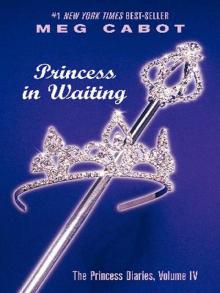 Princess in Waiting
Princess in Waiting Being Nikki
Being Nikki Abandon
Abandon Princess on the Brink
Princess on the Brink Darkest Hour
Darkest Hour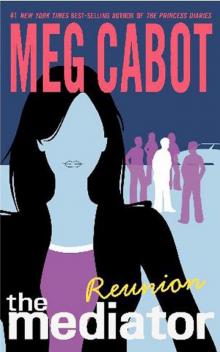 Reunion
Reunion Princess in Pink
Princess in Pink Sweet Sixteen Princess
Sweet Sixteen Princess The Princess Diaries
The Princess Diaries Airhead
Airhead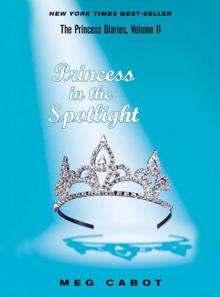 Princess in the Spotlight
Princess in the Spotlight No Judgments
No Judgments All-American Girl
All-American Girl Princess in Love
Princess in Love Forever Princess
Forever Princess Haunted
Haunted Shadowland
Shadowland Twilight
Twilight Princess Mia
Princess Mia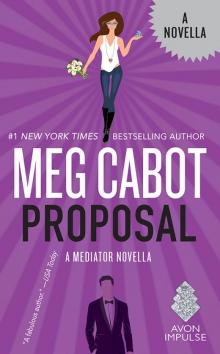 Proposal
Proposal Remembrance
Remembrance Ransom My Heart
Ransom My Heart Underworld
Underworld Shadowland tm-1
Shadowland tm-1 Size 14 Is Not Fat Either
Size 14 Is Not Fat Either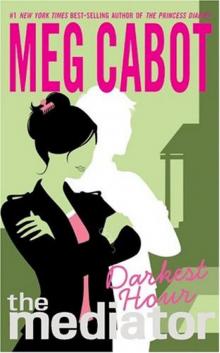 Darkest Hour tm-4
Darkest Hour tm-4 Airhead a-1
Airhead a-1 Royal Crush
Royal Crush The Princess Present (princess diaries)
The Princess Present (princess diaries) Royal Crown
Royal Crown Royal Wedding: A Princess Diaries Novel (The Princess Diaries Book 11)
Royal Wedding: A Princess Diaries Novel (The Princess Diaries Book 11) Princess Diaries, Vol. X: Forever Princess
Princess Diaries, Vol. X: Forever Princess Royal Wedding Disaster
Royal Wedding Disaster Allie Finkle's Rules for Girls: Glitter Girls and the Great Fake Out
Allie Finkle's Rules for Girls: Glitter Girls and the Great Fake Out Size 12 Is Not Fat hwm-1
Size 12 Is Not Fat hwm-1 Princess on the Brink pd-8
Princess on the Brink pd-8 The New Girl
The New Girl Allie Finkle's Rules for Girls: Moving Day
Allie Finkle's Rules for Girls: Moving Day Code Name Cassandra
Code Name Cassandra Mia Goes Fourth pd-4
Mia Goes Fourth pd-4 Sanctuary 1-4
Sanctuary 1-4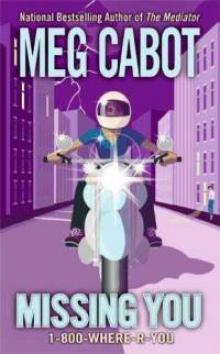 Missing You 1-5
Missing You 1-5 The Mediator 6: Twilight
The Mediator 6: Twilight Allie Finkle's Rules for Girls: Best Friends and Drama Queens
Allie Finkle's Rules for Girls: Best Friends and Drama Queens The Boy Next Door
The Boy Next Door Every Boy's Got One
Every Boy's Got One Princess Mia pd-9
Princess Mia pd-9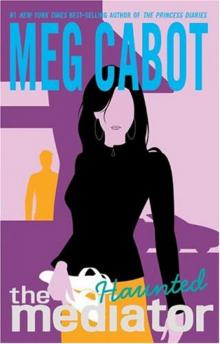 Haunted tm-5
Haunted tm-5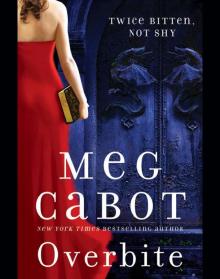 Overbite
Overbite Princess Lessons
Princess Lessons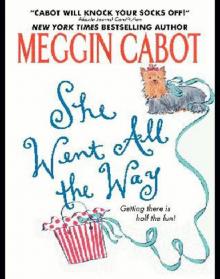 She Went All the Way
She Went All the Way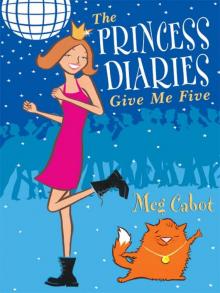 Give Me Five pd-5
Give Me Five pd-5 Twilight tm-6
Twilight tm-6 Jinx
Jinx Runaway (Airhead #3)
Runaway (Airhead #3) Queen of Babble Gets Hitched qob-3
Queen of Babble Gets Hitched qob-3 Forever Princess pd-10
Forever Princess pd-10 Queen of Babble
Queen of Babble Boy Meets Girl b-3
Boy Meets Girl b-3 Pants on Fire
Pants on Fire Big Boned ху-3
Big Boned ху-3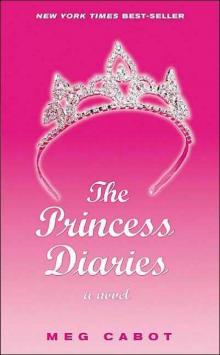 Princess' Diaries pd-1
Princess' Diaries pd-1 Size 14 Is Not Fat Either hwm-2
Size 14 Is Not Fat Either hwm-2 Awaken a-3
Awaken a-3 Queen Of Babble: In The Big City qob-2
Queen Of Babble: In The Big City qob-2 Nicola and the Viscount
Nicola and the Viscount Allie Finkle's Rules for Girls: Stage Fright
Allie Finkle's Rules for Girls: Stage Fright Size 12 and Ready to Rock
Size 12 and Ready to Rock Perfect Princess
Perfect Princess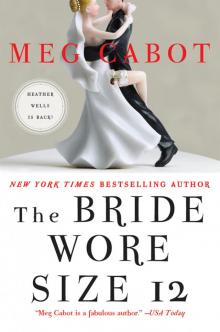 The Bride Wore Size 12
The Bride Wore Size 12 1-800-Where-R-You: Missing You
1-800-Where-R-You: Missing You How to Be Popular
How to Be Popular Queen of Babble Bundle with Bonus Material
Queen of Babble Bundle with Bonus Material Allie Finkle's Rules for Girls: Blast from the Past
Allie Finkle's Rules for Girls: Blast from the Past Princess in the Spotlight pd-2
Princess in the Spotlight pd-2 Ready or Not
Ready or Not The Princess Diaries I
The Princess Diaries I Party Princess pd-7
Party Princess pd-7 Third Time Lucky pd-3
Third Time Lucky pd-3 Stage Fright
Stage Fright From the Notebooks of a Middle School Princess
From the Notebooks of a Middle School Princess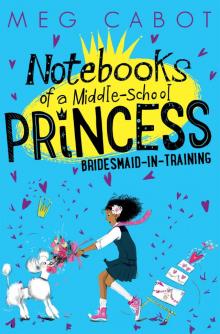 Notebooks of a Middle-School Princess Bridesmaid-in-Training
Notebooks of a Middle-School Princess Bridesmaid-in-Training Boy Meets Girl
Boy Meets Girl Missing You
Missing You The Twilight
The Twilight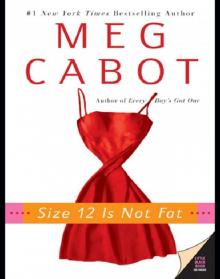 Size 12 Is Not Fat
Size 12 Is Not Fat Code Name Cassandra 1-2
Code Name Cassandra 1-2 Valentine Princess
Valentine Princess Project Princess
Project Princess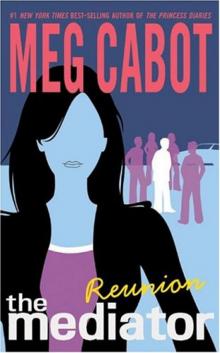 Reunion tm-3
Reunion tm-3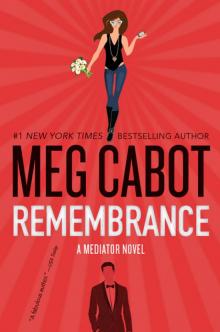 Remembrance: A Mediator Novel
Remembrance: A Mediator Novel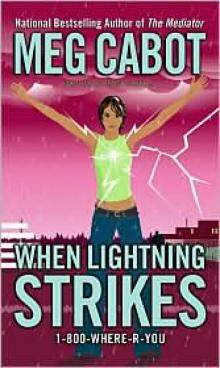 When Lightning Strikes 1-1
When Lightning Strikes 1-1 Safe House 1-3
Safe House 1-3 Teen Idol
Teen Idol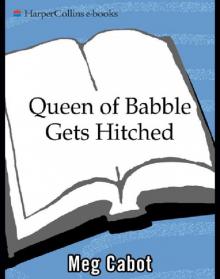 Queen of Babble Gets Hitched
Queen of Babble Gets Hitched Glitter Girls and the Great Fake Out
Glitter Girls and the Great Fake Out Moving Day
Moving Day Insatiable
Insatiable All American Girl
All American Girl The Boy Is Back + Every Boy's Got One Bundle
The Boy Is Back + Every Boy's Got One Bundle Big Boned
Big Boned Awaken
Awaken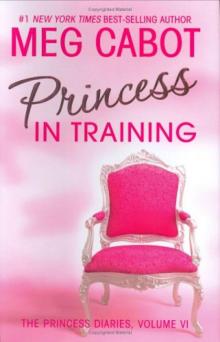 Princess in Training pd-6
Princess in Training pd-6